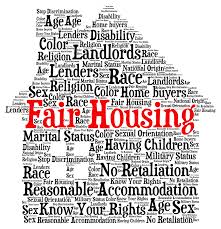Fair Housing Act Do’s and Don’ts
 The Fair Housing Act brings with it considerations for landlords that they must respect if they are going to properly respond to their tenants’ concerns. Any violation of the act, intentional or not, may result in a lawsuit that leans heavily towards the tenant and might cost you considerably more than just a fine. Here are a few do’s and don’ts to consider if you either own or plan to purchase rental properties.
The Fair Housing Act brings with it considerations for landlords that they must respect if they are going to properly respond to their tenants’ concerns. Any violation of the act, intentional or not, may result in a lawsuit that leans heavily towards the tenant and might cost you considerably more than just a fine. Here are a few do’s and don’ts to consider if you either own or plan to purchase rental properties.
Advertising
All ads that you send out to bring in tenants much comply with the act. This means that while you can restrict pets or smoking, you cannot restrict the presence of children or young adults. Even if you have not had good experiences with kids or teenagers, you will need to put that aside when advertising for new tenants. Any doubt about how your ad is presented should be taken to an attorney knowledgeable about real estate to ensure that it complies.
Understand the Law
First and foremost, you will need to act within the confines of the law when working with your tenants. You can start with the HUD website for a general outline of what the Fair Housing Act requires. Keep in mind that while many of the rules and regulations are obvious and grounded in common sense, there are a few that may catch you by surprise. Remember, ignorance of the law is no excuse, so you should be well versed on the act and all applicable laws.
Record All Interactions with Tenants and Prospective Tenants
This doesn’t mean you need to write down every passing greeting, but it does mean that any substantial interaction need to be recorded in a journal or diary so that if litigation should arise weeks later, you’ll be able to recall the details of the initial event. This is especially true for any interaction that had negative consequences, such as an application that was rejected, fines being applied to a tenant, charges for repairs, and so forth.
Anything You Say May Be Held Against You
Basically, this means that you should keep all conversation between you and your tenants on a strictly professional basis. Any personal feelings that may present, even seemingly innocent ones like boasting about your favorite football team, may be used against you in court. So, no matter your personal feelings, always be polite and courteous to your tenants and treat them all equally.
Be Consistent
In other words, follow the same questionnaire with all your potential tenants and treat every tenant you currently have in the same manner. Consistency is important because any significant variation may cost you in court. If you treat one tenant or prospective tenant differently than the rest for whatever reason, it becomes problematic to defend your actions.
The Fair Housing Act means that you need to be aware of the rules, regulations, and guidelines that govern your actions when it comes to the tenants on your property. If you are considering purchasing rental property, then you’ll need to become familiar with what the act covers and how you should respond.